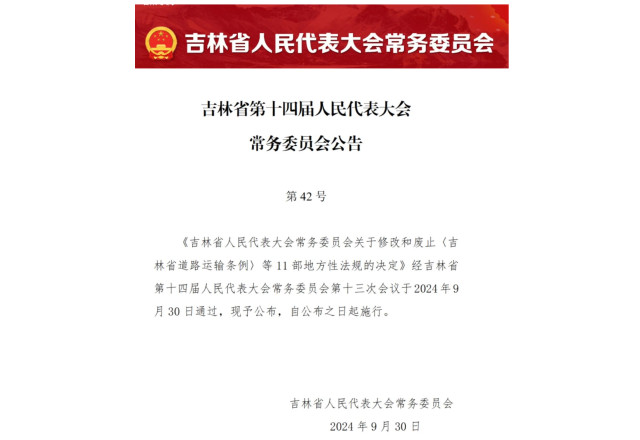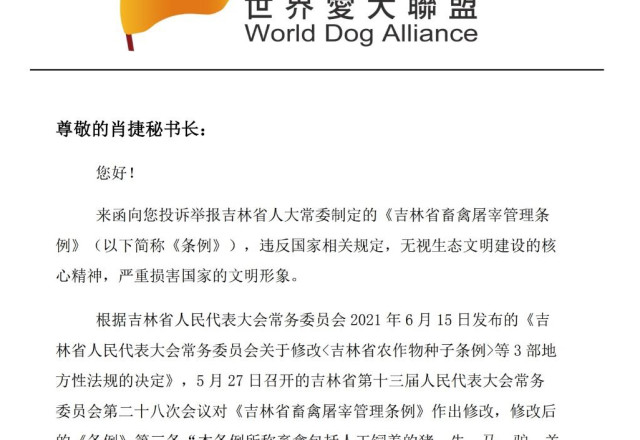World Dog Alliance Achieves Another Victory: China’s Jilin Province Puts an End to "Edible Dogs"
Online, December 19, 2024 (Newswire.com) - On September 30, 2024, the Standing Committee of the 14th Jilin Provincial People's Congress passed a decision to amend 11 local regulations. Among these amendments was a significant change to the Jilin Province Livestock and Poultry Slaughtering Management Regulations.
The specific amendments to the Jilin Province Livestock and Poultry Slaughtering Management Regulations are as follows:
Article 3, Paragraph 1:
Revised to: "The livestock and poultry referred to in these regulations include pigs, cattle, horses, donkeys, sheep, deer, rabbits, chickens, ducks, and geese raised in captivity."
(Original text: The livestock and poultry referred to in these regulations include pigs, cattle, horses, donkeys, sheep, deer, edible dogs, rabbits, chickens, ducks, and geese.)
Article 23:
Revised to: "Livestock and poultry products that have not undergone or have failed meat quality inspection shall not leave the slaughterhouse for sale."
(Original text: Livestock and poultry products that have not undergone or have failed meat quality inspection shall not leave the slaughterhouse.)
Article 28:
Revised to: "Livestock and poultry products must be transported using specialized vehicles. Carcasses of pigs, cattle, sheep, horses, donkeys, and deer must be transported in sealed and suspended conditions. Other livestock and poultry products must also be transported in sealed conditions using specialized containers. These vehicles must have clear identification, maintain a clean and intact appearance, and must not be used for other purposes. For transport exceeding four hours, cold chain logistics must be used."
(Original text: Carcasses of pigs, cattle, sheep, horses, donkeys, deer, and edible dogs must be transported in sealed and suspended conditions. Other livestock and poultry products must be transported in sealed conditions using specialized containers. Vehicles must have clear identification, maintain a clean and intact appearance, and must not be used for other purposes. Transport exceeding four hours must use cold chain logistics.)
The amendments clearly reflect the removal of "edible dogs" from the scope of the Jilin Province Livestock and Poultry Slaughtering Management Regulations.
The World Dog Alliance (WDA) first identified this issue in 2021. In September and December of that year, the WDA sent letters and made reports to the Central Fifth Inspection Group, the National People's Congress, the State Council, the Ministry of Agriculture, and Jilin Provincial authorities. The WDA argued that the inclusion of "edible dogs" in the regulations violated national laws, ignored the core principles of ecological civilization, and severely damaged China's image as a modern and civilized society.
After nearly three years of relentless advocacy, the term "edible dogs" has been removed from the Jilin Province Livestock and Poultry Slaughtering Management Regulations, marking a significant step toward banning dog slaughter and advancing the cause of banning dog and cat meat consumption nationwide.
Since the onset of the COVID-19 pandemic in early 2020, the WDA has achieved numerous milestones in pushing for legislative action to protect dogs and cats.
In January 2020, as misinformation spread about pets transmitting COVID-19 to humans, WDA Founder Mr. Genlin took immediate action to clarify misconceptions and advocate for legislative protection. On January 31, 2020, he sent 13 letters to top Chinese leaders and government departments, citing the World Health Organization's statement that no evidence supported claims of pets transmitting COVID-19. Mr. Genlin called on the Chinese government to ban the consumption of wildlife, dogs, and cats, and introduced the slogan: "Ban Wildlife Consumption for Public Health, Ban Dog and Cat Consumption for National Civility."
On February 27, 2020, Mr. Genlin received a reply from Xiao Jie, then Secretary-General of the State Council, acknowledging his recommendations. Inspired by this progress, he wrote again on February 28 to share the news of 30 U.S. Congress members urging then-President Trump to support the International Agreement to Prohibit the Eating of Dogs and Cats. Mr. Genlin expressed confidence in China's swift legislative action and encouraged the country to lead the global movement by initiating the International Agreement to Prohibit the Eating of Dogs and Cats.
By March 2020, major breakthroughs followed. Shenzhen and Zhuhai, two of China's most advanced cities, introduced regulations banning the consumption of dogs and cats alongside wildlife bans. In May 2020, the National Directory of Livestock and Poultry Genetic Resources was released, officially removing dogs from the livestock category. The Ministry of Agriculture explicitly stated: "With societal progress and increasing public concern for animal protection, dogs have transitioned from traditional livestock to companion animals."
The WDA's persistent efforts have significantly improved the welfare of dogs and cats in China. While the journey toward a nationwide ban on dog and cat meat remains long, the WDA is optimistic: "The road is long, but we will reach the destination with continuous effort."
We eagerly anticipate the expansion of laws banning the consumption of dogs and cats across China and look forward to the country taking the lead in initiating the International Agreement to Prohibit the Eating of Dogs and Cats, setting a global example of compassion and progress.
Source: World Dog Alliance


